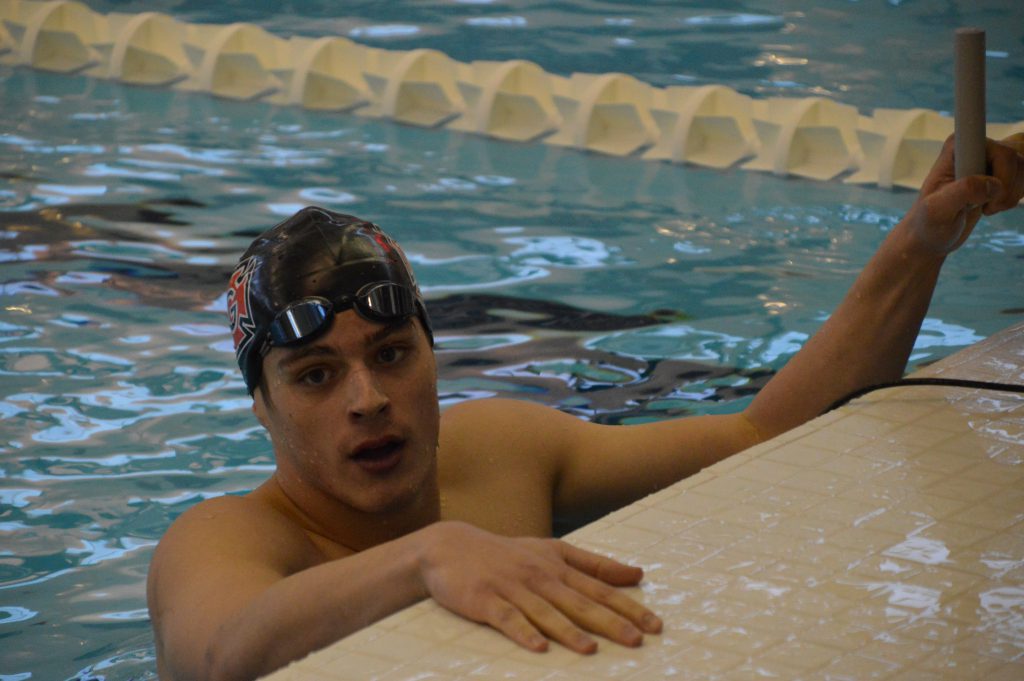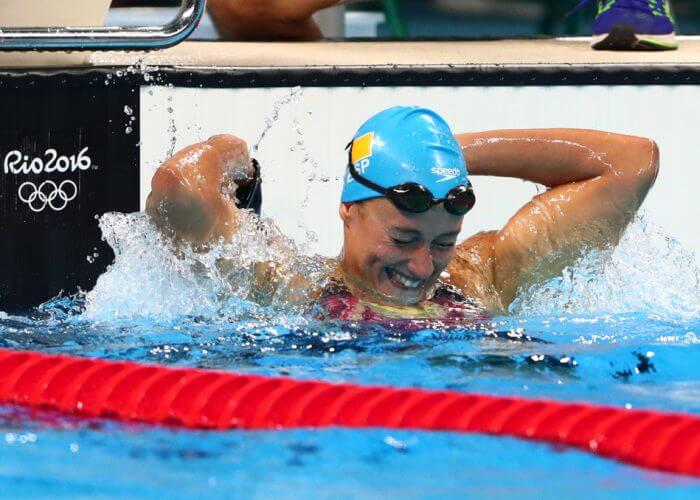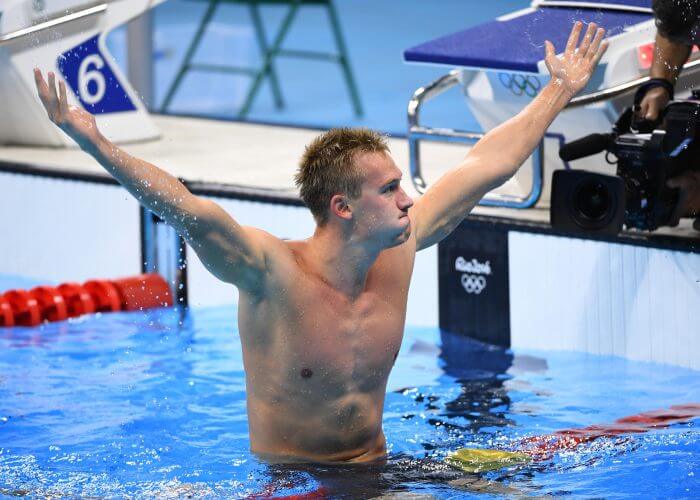The Psychology of Swimming: How to Channel Your Emotions

By Xonzy Gaddis, Swimming World College Intern.
You line up behind your lane and shake off the nerves you plan not to take into the water with you. Then, you take a deep breath as you hear the whistle signal that it is time to climb up on the block. Finally, the signal sounds. What do you feel?
The emotions that build up when it comes to racing in the sport of swimming are innumerable. The way emotions are handled varies by person, but they must be controlled to keep your head in the game, whether it is before, during, or after the race. Studies examine how emotions such as pleasure, regret, anxiety, etc. can have both a negative or empowering effect on how one swims.
Mitchell Sevier – Grinnell College’s current 100 fly record-holder – opens up about his experience with managing his emotions to translate into great performances. He uses this experience in his service as a student-athlete mentor for the Grinnell College Swimming and Diving Team.
Controlling Emotions

Photo Courtesy: Rob Schumacher-USA TODAY Sports
Emotional control typically begins with becoming aware of and identifying your emotions. Sevier describes the first times he took notice of his emotions, admitting that it takes quite some time to control such emotions. Sevier advises finding a routine, saying: “Stuff that I do before races adds a sense of normalcy and becomes habit. I know what I’m doing, and I’m going to just go for it.” Additionally, he recommends opening up to trusted people regarding these emotions and thoughts. “Find someone to talk to about these emotions and pay attention to them, because they are all valid. Ultimately, it comes down to how you approach and embrace the emotions instead of letting them consume you. Turn them into fuel.”
In other words, emotions do not simply need to be pushed to the side or given the reigns: they should be channeled into one’s swim in a way which leads to the most favorable outcome.
As one gets more attached to the sport of swimming, emotions intensify and take more effort to control. Scholar Olga Kouli explains in a journal article that “it is necessary that the athletes are aware of their optimal and dysfunctional zones, which means that the person is able to distinguish the successful states from the less successful ones and is able to enter and stay in the optimal zone during a performance.” Ultimately, Kouli advises all athletes to recognize their emotional zones, whether positive or negative, and remain in the their mind where they feel the most relaxed.
Giving them a Name

Photo Courtesy: Erich Schlegel-USA TODAY Sports
Emotional reactions to your race performance are a natural occurrence. The question remains: How can we optimize our emotional reactions to be better moving forward? Uzma Khan, a researcher from Stanford, completed a study on the emotions of swimmers after competing in multiple finals races. She found that swimmers who finish in second place experience more intense emotions of regret than those who find themselves in third place. Moreover, Khan found those same swimmers who came in second in that race went into the next race performing either relatively better or worse depending on how they internalized their performance. In other words, the amount of regret swimmers feel after one race has an effect on their next race, either vying for a better position or complete loss of optimism.
For Sevier, he identifies three main emotional states that he experiences either before, during or after a race and how to channel them to a healthy performance. First, Sevier finds that a common emotion one feels before a race is anxiety, which is “100 percent natural.” When this feeling arises, Sevier recommends recognizing the hard work you have completed to get to where you are, and that the body knows how to control and exert your energy in the water. Secondly, Sevier finds that joy is another feeling that hits after a race, especially when it exceeds your expectations and gives that extra bump of confidence. However, you must handle the happiness and excitement from success in a sportsmanship-like manner. In the same manner, you must handle feelings of failure in a sportsmanlike way, because when it comes to the team, “You must stay composed and be there for everyone instead of just for yourself. Everyone is on deck for the same reason: they all love to swim.” Lastly, during a race, Sevier notes the feeling of aggression is the main emotion felt with each stroke he takes. “Going fast is awesome, and no one should play it safe. Everyone should dare to dream big yet keep that balance,” Sevier remarks.

Photo Courtesy:Jack Gruber-USA TODAY Sports
Regret can often become an overwhelming feeling for athletes regarding their performances. Swimmers tend to put themselves in a mental bubble, which makes them dwell too much on perceived mistakes from a past race, whether it is the coach’s feedback on where their swim could have been better or the swimmer feels they could have gone faster. In response to these thoughts, Sevier reminds swimmers to, “Recognize every season is a new season, and at the end of day, you should recognize the opportunities you have. At the end of day, you should not let a race define who you are as a swimmer, and you should always come back to being there for the team.”
In conclusion, Sevier acknowledges that, “A lot of emotional baggage can come with being a swimmer.” Do your best to not let emotions overwhelm you when it comes to a swim. Learn to identify and channel your emotional energy to ultimately enhance your next performance, all while remembering that the outcome should not always define who you are in life.
-All commentaries are the opinion of the author and do not necessarily reflect the views of Swimming World Magazine nor its staff.




Leanne
Mackenzie Menuchak
Ian Stewart Colin Stewart
Tay Thomas
Edwina Ed…Sis Zabrina
Jordan Wright
I don’t need to read this as I can’t see the difficulty at all. Just stick to the technique as well as you can and when you do your best, that’s all there is to it. Emotions/feelings are irrational and irrelevant, an unnecessary variable in swimming
Neil Wible
Lauren Logan